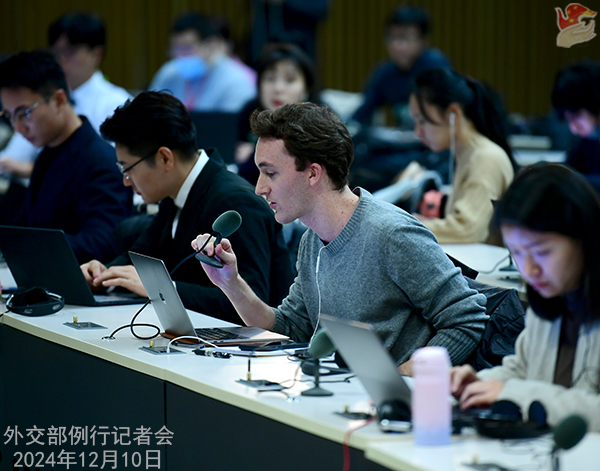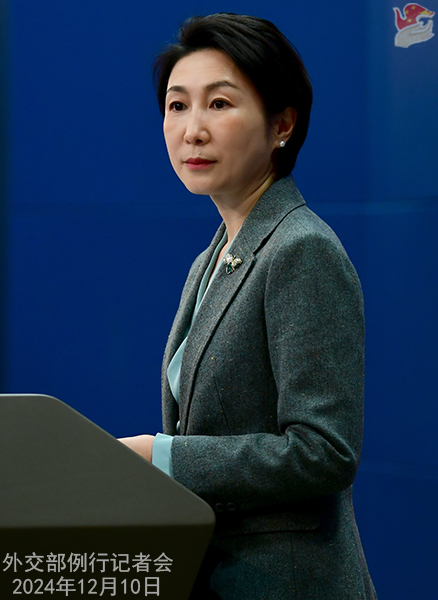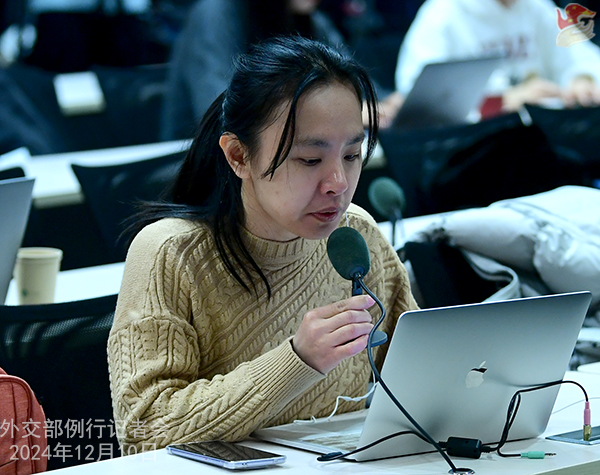
Xinhua News Agency: This morning President Xi Jinping met with the leaders of major international economic organizations. Can you further update us on that?
Mao Ning: This morning, President Xi Jinping met with the leaders of major international economic organizations at the Great Hall of the People who are in China to attend the “1+10” Dialogue. President Xi pointed out that with the acceleration of unprecedented transformation, the world has entered a new period of turbulence and change, and once again come to a critical crossroads. China is ready to work with the major international economic organizations to practice multilateralism, promote international cooperation, and support the development of Global South countries, so as to advance an equal and orderly multipolar world and a universally beneficial and inclusive economic globalization, and build a just world of common development.
President Xi underscored that how to bring the world economy onto a path of strong and sustainable growth is a major question for the international community. Countries need to build an open world economy through cooperation, see economic interdependence as a good thing that enables all to draw on each other’s strengths for mutual benefit and win-win results instead of taking it as risks. We should make the global economic governance system more just and equitable and reflective of the changing world economic landscape, with greater representation and voice of Global South countries. The global economic governance must adhere to the principle of extensive consultation and joint contribution for shared benefit, uphold true multilateralism, and ensure equal rights, equal opportunities and equal rules for all countries.
President Xi noted that after more than four decades of rapid growth, the Chinese economy has entered a stage of high-quality development. China has full confidence in meeting this year’s growth target and continuing to serve as the biggest engine of world economic growth. China will continue to expand opening up, put in place new systems for a higher-standard open economy, provide more opportunities for the development of other countries, and share more development benefits with the world.
AFP: Taiwan said today that China’s recent deployment of ships in waters around the island is bigger than the military drills in 2022 after then US House Speaker Nancy Pelosi visited Taipei. Does the Foreign Ministry have comment on this and is China currently conducting or does China plan to conduct military drills around Taiwan this week?
Mao Ning: I’d refer you to competent Chinese authorities for the specific question. What I can tell you is that the Taiwan question is China’s internal affair and China will firmly defend its sovereignty and territorial integrity.

People’s Daily: Today is the Human Rights Day and it marks the 76th anniversary of the adoption of the Universal Declaration of Human Rights (UDHR). Could you share with us what has been done by China in terms of human rights protection? We noted that some Western countries time and often criticize China’s human rights situation, so how do you respond to that?
Mao Ning: The Universal Declaration of Human Rights (UDHR), which was adopted 76 years ago, is of major significance in the history of human civilization and has a profound influence on the world’s human rights cause.
China always attaches high importance to respecting and protecting human rights and puts the people front and center. It has found a path toward better human rights that reflects the trend of the times and fits our national realities and made historic progress in our human rights cause. We have won the largest battle against poverty in human history as scheduled, lifting nearly 100 million impoverished rural residents out of poverty in the past decade and hitting the poverty reduction target of the UN 2030 Agenda for Sustainable Development 10 years ahead of schedule. China keeps improving the whole-process people’s democracy. There are over 2.7 million deputies at various levels of people’s congresses, including around 3,000 deputies to the National People’s Congress (NPC), which ensures that the people are the masters of their own country. China has set up the world’s largest education system, social security system and medical care system and the Chinese people’s average life expectancy has increased to 78.6 years. China protects human rights in accordance with the law, and the 305 laws currently in effect in China provide all-round legal safeguards for its human rights cause. China has put up a series of initiatives and propositions at the Human Rights Council under the themes including the promotion of human rights through cooperation and development, the economic, social and cultural rights and the rights and interests of specific groups, which makes positive contributions to the sound development of global human rights governance. The third plenary session of the 20th Central Committee of the Communist Party of China put forward over 300 reform measures covering such fields as economy, politics, culture, social life and ecological protection, which will effectively improve people’s well-being, promote social equity and justice and continue to better safeguard human rights.
Some countries have used human rights as a weapon to serve their political agenda, posing severe challenges to global human rights governance. We call on all parties to abide by the purposes and principles of the UN Charter, engage in constructive dialogue and cooperation in the field of human rights and work together for the sound development of the international human rights cause. We also hope that certain countries will discard megaphone diplomacy and stop interfering in other countries’ internal affairs under the pretext of so-called human rights issues.
Reuters: Has China informed other countries of its reserved air space restrictions off the coast of Fujian, Zhejiang and Shanghai that have been set up temporarily until Wednesday?
Mao Ning: I am not familiar with what you mentioned. I’d refer you to competent authorities.
China News Service: It was reported that the China Chamber of Commerce to the EU issued its annual Report on the Development of Chinese Enterprises in the EU yesterday, noting that “uncertainty” has become a defining factor for Chinese enterprises operating in the EU. The report proposed a number of policy suggestions to EU institutions and governments of EU members to improve the business environment for Chinese enterprises in the EU. What is China’s comment?
Mao Ning: We noted the report issued by the China Chamber of Commerce to the EU. The report reflects notable concerns of Chinese enterprises in the EU over the continued deterioration of the EU’s business environment. Survey data shows that 68 percent of respondents believe the business environment has worsened over the past year, with over half claiming the EU market is no longer “fair and open,” and 78 percent of respondents identifying “uncertainty” as a key characteristic of their operations.
Since October last year, the EU has taken over 40 restrictive trade measures on China. The new European Commission put increasing emphasis on “economic security,” and planned to reinforce the economic and trade toolkit and upgrade restrictive measures in such fields as investment review and export control. These moves are a complete departure from the principles of market economy, fair competition and free trade that the EU has long claimed to champion, undermined lawful rights and interests of Chinese enterprises and tarnished the EU’s own image. We hope the EU will listen carefully and earnestly address the reasonable and legitimate concerns of Chinese enterprises, avoid politicizing economic and trade issues or tying them to national security, and provide a fair, transparent and nondiscriminatory business environment for Chinese enterprises to invest and do business in Europe.

Beijing Youth Daily: As the chair of the P5 mechanism, China recently convened an expert-level P5 meeting in Dubai, the UAE. Could you share more information on that?
Mao Ning: On December 4, 2024, as the chair of the P5 mechanism, China convened an expert-level P5 meeting in Dubai, the UAE. Representatives from the five nuclear-weapons States (China, France, Russia, the United Kingdom and the United States) attended the meeting. The parties had a candid discussion on nuclear doctrines. It was agreed that such discussion was timely for the purposes of enhancing understanding of each other’s nuclear doctrines and avoiding misunderstanding and miscalculation. In its capacity as the chair, China will continue to facilitate the P5 discussions.
AFP: I have a question on Myanmar. A major ethnic rebel group in Myanmar called the Kachin Independence Army said yesterday that a delegation has come to China for talks. They did not provide any details on the location or content of these talks. Can you confirm these talks or provide more details?
Mao Ning: China is watching closely the situation in northern Myanmar. Conflict and chaos are the last thing we hope to see in Myanmar. China has been calling upon relevant parties in Myanmar to keep on having dialogue and consultation, realize ceasefire as soon as possible and prevent any damage to the security of Chinese borders and the safety of Chinese projects, businesses and personnel in Myanmar. We will continue to actively promote talks for peace and provide support and assistance to Myanmar’s peace process to the best of our capability.
Shenzhen TV: The US said it is taking steps to impose new visa restrictions on multiple Hong Kong officials responsible for implementation of Hong Kong’s National Security Law. The Foreign Ministry Spokesperson responded that China will take firm countermeasures. Can you tell us what are the countermeasures?
Mao Ning: We’ve made clear our serious position on relevant moves of the US side. The US used Hong Kong-related issues to slap visa restrictions on Chinese officials, which grossly interfered in China’s internal affairs, and seriously violated the principles of international law and the basic norms of international relations. In accordance with the Law on Foreign Relations of the People’s Republic of China and the Anti-Foreign Sanctions Law of the People’s Republic of China, China decided to impose visa restrictions on US personnel who have acted egregiously on Hong Kong-related issues.
It must be stressed that Hong Kong is China’s Hong Kong and Hong Kong affairs are purely China’s internal affairs. We urge the US to earnestly respect China’s sovereignty, respect Hong Kong’s rule of law and stop meddling in Hong Kong affairs in whatever form. China remains unwavering in its determination to safeguard the nation’s sovereignty, security and development interests, to implement One Country, Two Systems, and to oppose any external interference in Hong Kong’s affairs.
Bloomberg: I would like to ask China’s reaction to a statement by President Marcos of the Philippines that the Philippines will not send warships to confront China in disputed waters in the South China Sea.
Mao Ning: What happened between China and the Philippines at sea recently was caused by the Philippines’ deliberate infringement and provocation. China will continue to firmly defend its sovereignty and rights and interests in accordance with the law.
